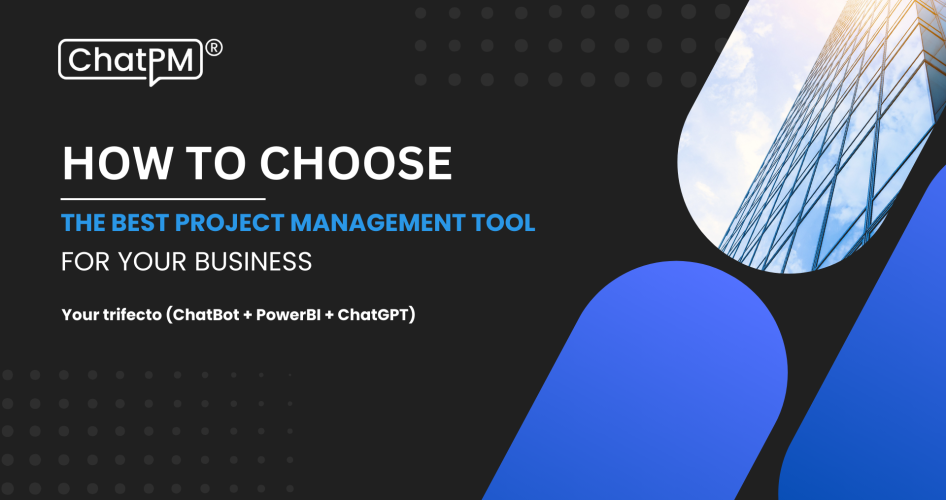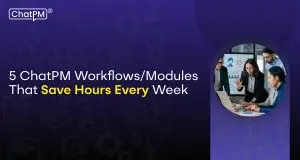Kick-starting a project from the ground-up or managing an ongoing project is not child’s play, and most business owners and project managers will agree to this. Whether managing the timelines, getting timely updates, estimating costs, or navigating through risks, project management can be quite a bumpy road.
But it doesn’t have to be this difficult, especially with quite a few software and tools available to support project management professionals. While project management tools can help smooth the entire process, finding the right one is critical. With so many options available, business owners may find themselves in a pickle while selecting the project management tool that truly fits with their unique business requirements.
Therefore, in this blog, we will take you through some key considerations for choosing the best project management tool for your business.
So, let’s get started!
Project Management Tools in a Nutshell
First thing first, let’s understand what project management tools are. These are software solutions that are designed to help teams plan, execute, and track projects. These tools empower your managers to organize tasks, allocate resources, monitor progress, and meet deadlines—all from one centralized platform.
For example, let’s imagine a construction company is building a new residential complex that involves coordinating several teams, such as architects, engineers, contractors, and suppliers. Without a project management tool, managing agreed project deliverables, planned construction activities, project risks, cost and schedule among many other important aspects, can become overwhelming and may lead to delays, cost overrun and unsatisfied client.
Project management tool allows seamless coordination among multiple teams, ensuring that the project stays on budget, on time, and meets stakeholders’ requirements.
In short, project management tools streamline processes, improve accountability, and enhance communication, leading to more efficient operations and timely project delivery.
Need for Automated Project Management tool for Next-Gen Businesses
In a rapidly changing business landscape, AI-based automated project management tools are not just beneficial but essential. They help organizations stay agile, responsive, and competitive, enabling them to meet the demands of the future while saving project costs and time. Here are some of the reasons why next-gen businesses need AI-based smart project management tools:
 1. Minimizing Complexity and Optimizing Efficiency
1. Minimizing Complexity and Optimizing Efficiency
One of the most significant benefits of automating project management is the dramatic boost in efficiency. With automation, repetitive and time-consuming tasks such as assigning tasks, updating progress, and sending reminders can be handled by the system, freeing up valuable time for teams to focus on high-priority work.
Project management tools can easily tackle tasks assignments, timely notifications and alerts, and workflow automation. This not only boosts efficiency but also reduces the complexity that comes with managing projects. By eliminating repetitive manual tasks performed by regular project management team, businesses can complete projects faster, improve output quality, and better utilize their resources.
2. Cost and Time Saving
Automating project management activities can lead to substantial cost savings across the board. By streamlining processes and reducing manual errors, companies can reduce efforts and time taken to manually completing project-related activities.
Automated systems provide a clear view of resource usage, helping businesses allocate staff, materials, and time more effectively. By knowing exactly how much time and resources are being spent on each task, project managers can avoid over-budgeting or under-utilizing resources.
Adoption of a project management tool leads to fewer errors, optimized resource allocation and timely completion of tasks, therefore, a higher probability to complete the project ahead of schedule.
3. Real-Time Data Reporting and Analytics for Prompt Decision Making
Access to real-time data is essential for making informed decisions and staying on top of project progress. Automated project management tools offer built-in dashboards and reporting features that provide up-to-date insights into every aspect of a project.
With the right project management tool, you can get instant insights, create custom reports, and conduct predictive analytics to predict potential roadblocks or delays.
Managers can also view the status of tasks, timelines, and resource allocation in real time, allowing them to make swift adjustments when needed to keep the project on track.
By providing real-time data and comprehensive reporting capabilities, automation empowers businesses to maintain full visibility over projects, make data-driven decisions, and ensure alignment with strategic goals.
Must-Have Features of a Project Management Tool
While choosing the Right Project Management Tool for your business, it’s essential to look for a solution that not only helps manage day-to-day tasks but also enhances overall business productivity. The best project management tools are designed to bring all necessary features under one roof, streamline operations, and scale as your business grows.

Some of the essential features are listed below that will help you select the right tool:
1. Single Source of Truth
A project management tool must act as a single source of truth, providing a unified platform where all project-related data is collected, stored, analyzed, and visualized. It should serve as “one pane of glass” that collects, stores, analyzes and visualizes all the data in one trusted platform, accessible based on roles and permissions.
This approach ensures that everyone, from project managers to team members and stakeholders, is working with consistent, accurate, and up-to-date information.
With right project management tool, you can get centralized access to all your data stored in one trusted location, easily accessible for all the stakeholders. You can also grant access based on different roles such as risk manager, communication manager, accounts department, etc.
A single source of truth minimizes confusion, reduces the likelihood of errors, and ensures transparency and accountability across the project lifecycle.
2. Task Management
Effective task management is the backbone of successful project execution. A good project management tool allows for the assignment, tracking, and prioritization of tasks in a structured way. With a Role-Based Access Control (RBAC) approach, tasks can be assigned to the right people based on their expertise and project role, ensuring clarity, responsibility and data confidentiality.
As a project manager, you can set task priorities based on deadlines or priorities, ensuring that critical tasks are completed first.
And that’s not all, project management tool sends notifications to stakeholders and team members when tasks are assigned, updated, or completed, keeping everyone informed.
3. Progress Tracking
Progress tracking is essential for ensuring projects stay on track and meet deadlines. A strong project management tool should offer easy-to-use tracking based on:
- Deliverables: Helps track progress on specific deliverables and ensure they are aligned with project goals.
- Milestones: Helps set milestones at project, program, and portfolio levels to monitor how far along a project is in its lifecycle. This allows for high-level tracking of key phases or objectives.
- Project Management Domains: Whether you are tracking scope, time, cost, or risk, progress can be monitored across different project management domains to ensure holistic oversight.
This multi-level progress tracking capability helps project managers quickly identify delays, resolve bottlenecks, and maintain control across all projects, programs, and portfolios.
4. Reporting & Analytics
Reporting and analytics are essential for measuring performance and making data-driven decisions. A strong project management tool should provide functionalities like live reporting through integration with powerful visualization tools such as PowerBI , ideal for monitoring real-time status of various projects.
It should also allow users to create custom reports and dashboards based on real-time data, hence allowing managers to analyze key metrics specific to their business needs.
Live reports and dashboards ensure that businesses are not just reacting to issues but proactively managing risks and taking prompt and necessary actions to improve performance.
5. Customization & Scalability
As businesses grow and evolve, their project management needs change, and the right project management tool must offer both customization and scalability to keep up.
The flexibility to adjust workflows, fields, and reporting is crucial for meeting specific project or industry requirements, whether businesses need to adapt to new processes or tailor solutions to unique business needs.
Furthermore, a scalable tool should be capable of supporting larger teams, more complex projects, and multiple departments as the business expands—without requiring major structural changes or reconfigurations.
Importantly, as the tool scales, it should preserve the fundamental configurations that were initially put in place, avoiding the need for costly overhauls.
6. Integrations with Other Tools
In today’s interconnected workplace, seamless integration with other systems is vital for efficient communication and workflow management.
A strong project management tool should integrate easily with widely used platforms like Microsoft Teams, Microsoft PowerBI, Microsoft Azure, etc., ensuring that updates are centralized without requiring users to switch between apps.
Additionally integrating with solid databases like SQL or MangoDB, allows for structured storage of data, making it easier to organize, retrieve, and manage project information and supports relationships between different data sets, enabling complex queries and data integrity.
These integrations enable businesses to operate more efficiently, keeping projects moving smoothly.
7. Customer Support
Customer support is another critical factor in choosing a project management tool. The best tools offer Hypercare support, where issues are addressed immediately without disrupting business operations.
This support often involves direct, real-time access to technical teams who can resolve problems quickly. Continuous improvement is also facilitated through feedback loops, where periodic feedback from users helps the provider improve the platform to meet new business challenges.
Proactive monitoring and regular updates further ensure that the tool remains reliable and secure, with the latest features and security patches in place.
ChatPM®: Your Go-To Project Management Platform
If you’re looking for a project management solution that checks all the boxes, ChatPM® is your go-to tool. ChatPM® is not just another project management tool; it’s your intelligent virtual project management assistant designed to simplify project management tasks and empower teams to achieve their goals efficiently.
Designed by Project Managers for Project Managers, ChatPM® offers everything you need to manage projects more efficiently and effectively, such as:
- MS Teams Bot: ChatPM® integrates seamlessly with Microsoft Teams, becoming a key component of your team’s communication hub. Whether it’s task assignments or progress updates, the ChatPM® bot ensures that everyone stays aligned without leaving their preferred workspace.
- PowerBI Dashboards: Unlock valuable insights into your project’s performance with interactive PowerBI dashboards. ChatPM® utilizes data analytics to deliver real-time visualizations, helping stakeholders make informed decisions and drive project success.
- ChatGPT Data Analytics: Leverage ChatGPT’s natural language processing to analyze project data, extract actionable insights, and support data-driven decision-making. ChatPM® converts raw data into meaningful intelligence, enabling teams to optimize workflows and achieve better results.
- Integration with Microsoft Azure: By harnessing Microsoft Azure’s powerful infrastructure, ChatPM® guarantees scalability, reliability, and security. Azure integration supports seamless operations, from data storage to computational resources, enhancing the overall user experience.
- Import/Export Project Data: Easily import and export project data between ChatPM® and other tools or platforms. Whether you’re integrating with existing project management systems or sharing data, this feature ensures smooth collaboration.
- Hypercare Support: Benefit from dedicated support during critical project phases with ChatPM®’s Hypercare feature. From project initiation to post-deployment, ChatPM® provides proactive assistance, troubleshooting, and guidance to ensure project success.
Whether you’re a small startup or an established enterprise, ChatPM® offers the tools and flexibility you need to manage projects effectively, reduce manual effort, and keep your team aligned. Ready to transform your project management? Let’s talk!







